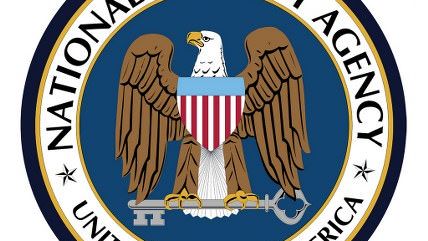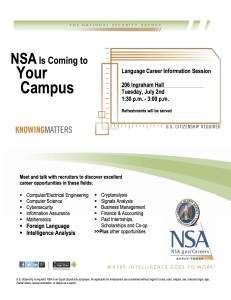NSA Recruiters Peppered With Tough Questions by University of Wisconsin Students


The NSA may have an easier time finding new Edward Snowdens than dutiful communications-sniffers if a recruiting session gone … not wrong, but interesting, at the University of Wisconsin is anything to go by. The session was recorded on an iPhone by one attendee and the transcript and recording published by Madiha R. Tahir, a journalist who is spending the summer "studying a language" at the university. In a blog post on the recruiting session, which quickly turned into a Q&A featuring a series of pointed questions targeted at the NSA recruiters, Tahir's description of the give and take reveals a great deal of not just skepticism, but open hostility, toward the spy agency among the attendees.
I had intended to go simply to hear how the NSA is recruiting at a moment when it's facing severe challenges, what with the Edward Snowden and all. Dismayingly, however, a local high school teacher had thought it was good to bring 5 of his students to the session. They were smartly dressed, some of them even wearing ties as if there might be a job interview, young faces in a classroom of graduate students. They sat across from me at the roundtable. It was really their presence that goaded me–and I think a couple of other students–into an interaction with the recruiters.
The session with recruiters, described by Tahir as "a redhead who looked more like a middle-aged mother (listed as "NSA_F" below) and a portly, balding man ("NSA_M")" quickly gets heated.
Part of the transcribed conversation is below:
Me: You said earlier that the two tasks that you do: one is tracking down the communications of your adversaries and the other is protecting the communications of officials. So, do you consider Germany and the countries the US has been spying on to be adversaries or are you, right now, not speaking the truth?
Me: I mean do you consider European countries, etc, adversaries or are you, right now, not telling us the truth and lying when you say that actually you simply track – you keep focusing on that, but clearly the NSA is doing a lot more than that, as we know, so I'm just asking for a clarification.
NSA_F: I'm focusing on what our foreign intelligence requires of [garbled] so, I mean you know, You can define adversary as enemy and clearly, Germany is not our enemy but would we have foreign
national interest from an intelligence perspective on what's going on across the globe. Yeah, we do. That's our requirements that come to us as an intelligence community organization from the policymakers, from the military, from whoever –our global so–Me: So adversary –adversaries you actually mean anybody and everybody. There's nobody then by your definition that is not an adversary. Is that correct?
NSA_F: That is not correct.
Me: Who is not an adversary?
NSA_F: Well, ok. I can answer your questions but the reality is—
Me: No, I'm just trying to get a clarification because you told us what the two nodes of your work are but it's not clear to me what that encompasses and you're being fairly unclear at the moment. Apparently it's somebody who's not just an enemy. It's something broader than that. And yet, it doesn't seem to encompass everyone.
NSA_M: So for us, umm, our business is apolitical. Ok. We do not generate the intelligence requirements. They are levied on us so, if there is a requirement for foreign intelligence concerning this issue or this region or whatever then that is. If you wanna use the word adversary, you ca– we might use the word 'target.' That is what we are going after. That is the intelligence target that we are going after because we were given that requirement. Whether that's adversary in a global war on terrorism sense or adversary in terms of national security interests or whatever – that's for policymakers, I guess to make that determination. We respond to the requirements we are given, if that helps. And there's a separation. As language analysts, we work on the SIG INT side of the house. We don't really work on the information assurance (?) side of the house. That's the guy setting up, protecting our communications.
Me: I'm just surprised that for language analysts, you're incredibly imprecise with your language. And it just doesn't seem to be clear. So, adversary is basically what any of your so-called "customers" as you call them –which is also a strange term to use for a government agency– decide if anybody wants, any part of the government wants something about some country, suddenly they are now internally considered or termed an 'adversary.' That's what you seem to be saying.
[Pause]
NSA_M: I'm saying you can think about it using that term.
Tahir points out something that has bothered me since the beginning of the series of revelations about the scope of domestic surveillance: the reliance on the word "legal" as a justification for every intrusion into the nooks and crannies of our lives. Tahir says, "What is legal is not just." I would add that "legal" just means that politicians have gone through channels to give themselves permission to do what they want to do.
See Tahir's full post here and listen to the recording below.


Show Comments (31)